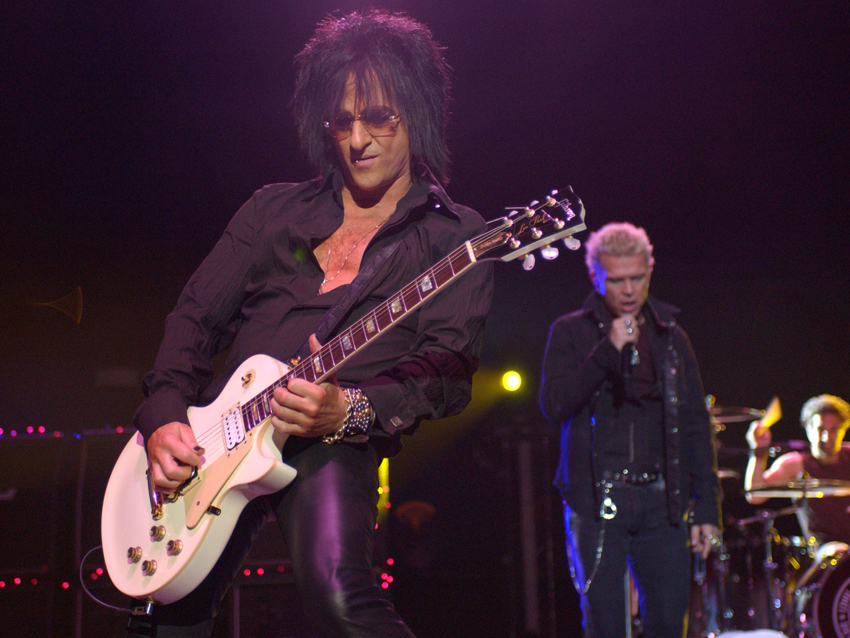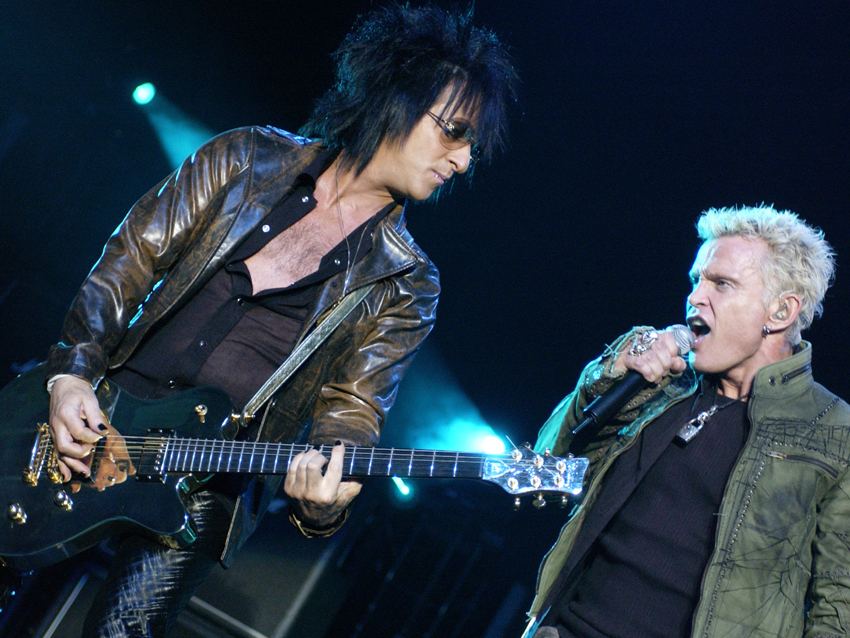
The best
Continuing our series My Best And Worst Gigs Ever, longtime Billy Idol guitarist and collaborator Steve Stevens talks about one show that stands out in his mind as being the greatest he's ever played – and one that didn't work out so well.
“How do you define a great show? The size of the audience? How well you played? The crowd response? By that criteria, I’ve been pretty fortunate to have played a lot of fantastic shows. But there is one gig that stands out in its own unique way as being pretty special.
“Billy and I hadn’t worked together in a while, maybe 10 years or so. He had moved out to Los Angeles in 1989 or '90, and I stayed in New York. Finally, after quite a while, I got a phone call from him about working on a new record with him. So I came out, I relocated, and we tried to get things going. There were a few problems, mostly with record companies – Chrysalis Records folded, Billy’s contract got shifted around – so right as we tried to move forward, we found ourselves in limbo. We were writing songs, but we didn’t really have a band in place. We weren’t playing any gigs, weren’t recording – it was frustrating. We knew we wanted to make music together, but we felt stuck.
“Right around this time, we were contacted to do an episode of VH1’s Storytellers, and it wound up being the real catalyst for us moving forward. It gave us a reason to put a band together; it just seemed to be a spark that set other things in motion. I don’t know if we had an inkling at first about how important it would be, but pretty quickly we sensed, ‘Wow, something’s happening here.’
"It was a challenge, but it was fun. Stripping the songs down allowed us to rediscover each one and see it in a new light."
“The thing about the show is that you go through the old material; you do your catalog of hits and talk about the songs. Playing the songs mostly acoustically allowed us to tear them apart and reinterpret them. It was a challenge, but it was fun. Stripping the songs down allowed us to rediscover each one and see it in a new light. You get so used to playing your stuff a certain way, so sometimes it really helps to start from point A again and go, ‘All right, what is this song all about? What were we thinking when we wrote it?’ It meant a lot to us in the short-term of doing the show, but it ultimately had some long-term benefits.
“When we arrived in New York to do the taping, I was immediately swept up in this incredible wave of nostalgia. Riding the van from JFK to the hotel, we passed all the old places: our rehearsal room where we spent so much time, pizza shops we used to go to, clubs we hung out at and played, record shops, you name it. It was pretty emotional for me to drive by and see all of these spots from our past.
“Here we were, coming to New York to revisit our past, and I’m seeing all of these monuments that brought back all of these memories. It seemed to put everything into perspective, and so when we got to the studio to do the taping, there was already a special aura to what we were doing. The whole thing started to take on a deeper kind of importance. Even though we were there to look at our past, it really prove to be a step towards our future.
“Billy and I hadn’t been on stage together in so long, but from the minute we started playing, everything felt fresh and new. Some aspects about what we did acoustically during the taping have even stayed with us to this day. We still play White Wedding half-acoustically because of how fun it was at Storytellers. And at the end, we did some songs on electric, just to remind everybody, you know, 'Hey, we still play some loud rock 'n' roll!' [Laughs]
“It was a really cool experience for us. Beyond the technical elements that you always concern yourself with – the sound was good, we looked good, things like that – there was the emotional aspect to it, and that just grew and grew. Billy and I looked at the footage, and we were so happy that what ended up on tape was exactly what we were feeling. Sometimes that can get lost in translation, but there was a real purity to this undertaking, and its something that's stuck around.”

The worst
“Trying to pick a ‘worst gig’ is tough. No matter what, playing music in front of people is always a privilege. An audience of people who have paid their hard-earned cash to see you play – how on earth can you say that’s a bad thing?
“But there is one show that I’d rather forget, and it's one that never should have happened – or I shouldn't have let it happen, put it that way. It was 1987 or ’88. The wheels were already in motion for me to leave the Billy Idol organization. Billy knew that I was going, but I had committed to doing this last tour with him. We played the US and Canada before finishing in Australia. By now, communication had broken down between Billy and me; the vibe couldn’t have been worse.
“So that last gig was bad. I had a premonition it was going to be bar because things had been building up for weeks prior. People were taking their frustrations out on one another, and I was doing things like treating my guitar tech badly – not my style at all. It was just a shitty time in general.
"Back then, we were all full of ego and whatever substances we were on – there was no talking to each other."
“It’s such a horrible feeling to go on stage in that kind of mood, with this black cloud hanging over you. Every song takes on a new meaning, and not a good one. I just didn’t want to be there at all. I mean, think about that: You dream of being on stage, you work and work to make it, and then you can’t wait for a gig to end. That was probably the only time I was ever on stage and wished that I were somewhere else. And this was at, for all intents and purposes, the height of our career. We were having hit records and selling out shows – the stuff every musician wants.
“The weirdest thing was, I got frustrated at my guitar and I smashed it and threw it out into the audience. But then I was told, ‘No, no, you have to take it back with you because it’s on the carnet.’ A carnet is the list of gear that you bring with you to a country, and you have to have that same gear with you when you leave; otherwise, they think you’re selling equipment or doing something underhanded. So I couldn’t even do the symbolic rock thing of ‘Yeah, I smashed my guitar! I’m outta here – fuck this!’ I had to go back and get the busted-up guitar to take back with me. [Laughs]
“As you get older and wiser, you learn how to handle disagreements. You’re just honest and you say, ‘You know what? Maybe this isn’t the right thing.’ Or, ‘What do you wanna do? Here’s what I’d like to do.’ Whatever it is, you learn to hash it out, give and take. You realize it’s not about you all the time and that other people have valid ideas. Back then, we were all full of ego and whatever substances we were on – there was no talking to each other.
“I chalk the whole thing up to youth and immaturity. I would never allow something like that to happen now. I’d call a meeting with everybody and hash things out. That way, you can figure out whatever problems you’re having and get back to making good music. Music is a gift, and no matter what, you have to honor it – for yourself and the audience. But yeah, that was a bad gig. Never to be repeated.”
Joe is a freelance journalist who has, over the past few decades, interviewed hundreds of guitarists for Guitar World, Guitar Player, MusicRadar and Classic Rock. He is also a former editor of Guitar World, contributing writer for Guitar Aficionado and VP of A&R for Island Records. He’s an enthusiastic guitarist, but he’s nowhere near the likes of the people he interviews. Surprisingly, his skills are more suited to the drums. If you need a drummer for your Beatles tribute band, look him up.
